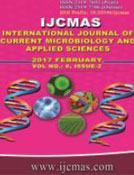


 National Academy of Agricultural Sciences (NAAS)
National Academy of Agricultural Sciences (NAAS)

|
PRINT ISSN : 2319-7692
Online ISSN : 2319-7706 Issues : 12 per year Publisher : Excellent Publishers Email : editorijcmas@gmail.com / submit@ijcmas.com Editor-in-chief: Dr.M.Prakash Index Copernicus ICV 2018: 95.39 NAAS RATING 2020: 5.38 |
Street foods and restaurant foods play a significant role in people’s day-to-day food options as well as their consistent nutritional requirements are dependent on these foods. As their ever-growing demanding schedule take away the chance to eat homemade food. Due to convenient availability, these eateries foods are one of the primary food choices especially for city people. Over the years, many food-borne diseases have been appeared due to contaminated non-homemade food intake. Navaratri is one of the major fasting time in India. Lots of individuals observe fast during this holy period. Many restaurants and street side stalls offer different kind of fasting food during this season. This study was conducted to analyze the microbiological quality of selected fasting foods which are sold in street side stalls, mid-level restaurants and high-level restaurants during Shardiya Navaratri. This study examined the microbiological quality of four most generally consumed fasting food items of road side carts, mid-level restaurants and high-level restaurants of each district in National Capital Territory of Delhi, India. Total Plate count (TPC), yeast and mold and presence of E coli were determined and observed in this study. The results show that fasting food samples collected from high-level restaurant have less microbial load than the samples collected from street side cart and mid-level restaurant foods. This study specifically highlights the level of microbial loads found in various available non-homemade foods during festive season of Navratri. Finally, this study endorses that some precautionary measures which the administration and food-maker together should follow and maintain the standard sanitary procedure to prepare, cook and handle foods. Implementation of such measures, rules and guidelines on street food vendors and restaurant foods are enormously crucial to maintain the sanitary condition as well as to prevent dispersion of harmful organisms through consumption of contaminated foods.
 |
 |
 |
 |
 |